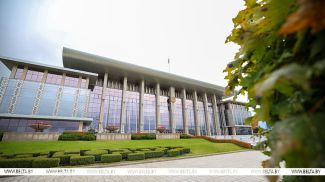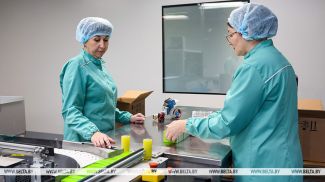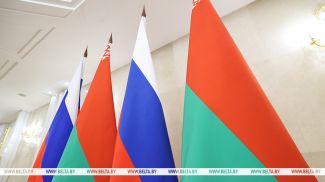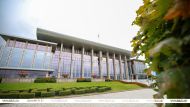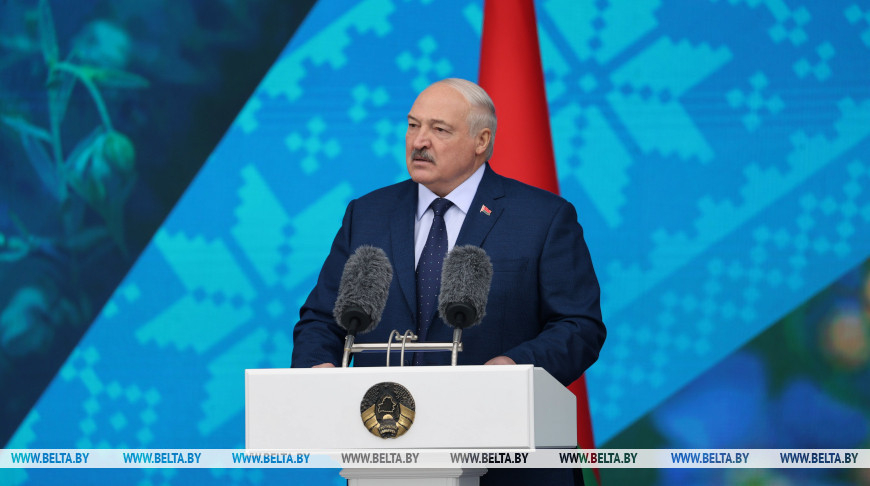
POLOTSK, 8 November (BelTA) – In the next five-year term the problem of Vitebsk Oblast should be put to rest and it is necessary to decide how to proceed with the development of agribusiness. Belarus President Aleksandr Lukashenko made the statement as he delivered a speech during the Vitebsk Oblast harvest festival Dazhynki 2024 in Polotsk on 8 November, BelTA has learned.
Aleksandr Lukashenko said: “I am scared to even think about the volume of the work that we need to do in Vitebsk Oblast. But what the eye fears, the hands do. Whether we want it or not, judging from our experience, in the next five-year term we should put to rest the problem of Vitebsk Oblast. We should solve it in a positive manner and make up our minds about what else we will do here. After all, half of the agricultural enterprises in Vitebsk Oblast are normal. They work. They can work. While half or maybe slightly less than that need support and the relevant organization. We will talk about it in spring, before the sowing campaign. At some point in March. Extremely hard work is ahead of us. We will help those, who produce results. I want you to understand that we cannot waste someone else’s money. Helping means taking money from someone else and giving it to you. But we should give it to those, who will return twice as much tomorrow. We need to be able to recoup these investments. A simple formula. Life has not invented another one and will not invent one. If you take money, you have to give it back.”
In his words, results of this year are rather contrastive. There are individual districts and enterprises that look decent in comparison with the country’s leaders. “The only question is how we can make these accomplishments a norm for Vitebsk Oblast,” the head of state said. “Moreover, more than eight years ago you convinced me to start an experiment by setting up agribusiness industrial groups as the foundation of Vitebsk Oblast’s future agribusiness complex. It is the right thing to do. I see absolutely no problems with it. It is possible to polish our options within the framework of these agribusiness groups. If we see that they are not good at all, we will disband them and the agricultural enterprises will work on their own like they did in the past. But it is always easier to operate by combining efforts, by working out a system. We will see in spring what specialists say about these matters.”
At present six agribusiness groups combine about 130 Vitebsk Oblast agricultural enterprises. “In other words, those, who can work on their own, work well. I gave instructions to leave them be. Those, who don’t want to work or face objective problems, should be merged. We should think about how veterinary services will work and the rest,” the Belarusian leader explained.
As far as the agribusiness groups are concerned, they have introduced a lot of innovations and preferences even on the scale of the country: from raw materials zones and economic incentives for processing to peculiarities of personnel management. “I have not forgotten your promises. By 1 March we will sum up results of the work of these structures. And I want you to understand that there will be no mercy due to the presidential election campaign if you fail your work. Populism is out of the question,” the president warned.
The head of state cited data, according to which Vitebsk Oblast has gathered in about 900,000 tonnes of cereals this year. “But it fell short of the base target: at least 1 million tonnes. If we talk about grain, they did rather well with maize: 100,000 tonnes up from last year. The yield of this crop nearly beat that of Grodno Oblast. Vitebsk Oblast came in second. If it is true. I think it is true. 90 centners per hectare,” he said. “It is even above the country’s average. It indicates that you can do it.”
“Well, as for cereal crops, you have slightly more than 20 [centners per hectare]. Feel free to make comparisons,” the head of state remarked.
“The oblast governor and I discussed matters on the way here. I plainly told him that Vitebsk Oblast residents can do everything. Even if you build [animal husbandry] complexes poorly, if you cannot do a simple construction project well, it doesn’t mean that you don’t know how to do it. It happens because someone doesn’t want or couldn’t care less about dealing with the issues that need to be addressed today. But people in Vitebsk, Polotsk, other cities and villages in Vitebsk Oblast know how to do absolutely everything,” the Belarusian leader stressed.
Aleksandr Lukashenko noted that a government conference will be held in March 2025 in order to discuss what needs to be done to Vitebsk Oblast agribusiness. “We have room for growth in Vitebsk Oblast. I think that we will focus on grass farming rotation and milk after all. It may be too much to expect good yields of cereals in the north. To the north of Polotsk, Vitebsk. We fail at it. This is why we should proceed from the real situation and do what’s necessary. We and the oblast administration agree that it is necessary to determine locations where we will build dairy complexes,” the president said.
Accordingly the complexes will need forage. But the head of state drew attention to the key thing: the complexes, milk, and meat production are not the problem. The country has plenty of these products. “People are the problem. I cannot imagine that Vitebsk Oblast will be kind of a barren and boring land without people. An empty land. It will never happen,” the Belarusian leader stressed.
He stated that Vitebsk Oblast has its own peculiarities, including negative ones, in comparison with Belarus’ southern parts. But crop farming conditions are even more complicated to the north: in Russia, Norway, and Finland.
“I am trying to say that Vitebsk people are not wanted somewhere over there. You and I will live in this land but we need to clearly determine what we will do here. If people are left, then we need to determine where they will work, what wages and working conditions they will get,” the president stated.
Speaking about Vitebsk Oblast’s performance in agribusiness, Aleksandr Lukashenko mentioned he had been getting reports that the region had considerably increased the forage base and the harvesting of forage: “You may have increased it by a third in terms of forage units. But I am a man of the earth. I know how forage units are calculated. But you don’t talk about their quality. What is the quality of forage in this trench? Have you made adjustments? Or do you keep rotten forage here that will result in terrible cattle losses? You will be held accountable for it as well.”
“On the whole, dear friends, it is time to do better. Moreover, you know how to do it. Think about how you’ll do it. And report. We will make final decisions together,” the head of state said.
He stated that Vitebsk Oblast has a handful of accomplishments in animal husbandry, primarily in poultry farming and milk production. “You have even managed to organize additional shipments of eggs. You’ve lent a helping hand to Russian brothers when they asked us for it,” Aleksandr Lukashenko remarked. “By the way, there is a huge demand for our products in Russia now. Feel free to sell.”
The president also noted that a soya farming experiment in the region had proven to be successful. “The results are reassuring. The first 100 hectares had yields of 30 centners per hectare. It is not that bad for soya. It means that we should farm this crop in Belarus,” the head of state said. “We spend hundreds of millions of U.S. dollars to buy this forage. We buy a huge amount of soya abroad. Why can’t we farm it here?”
“As you can see, even soya can be grown in Vitebsk Oblast. It is experience. And the minister has been instructed to spread the practice onto Belarus,” the Belarusian leader added.
“I have said many times that a breakthrough is impossible without a new scientific and technological foundation: thanks to selection, better productivity, the observance of technologies both in crop farming and animal husbandry. A certain base is available but we need more tangible results today. So that you could at least live normal lives,” Aleksandr Lukashenko stressed.




